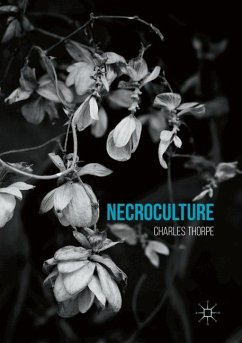In this book, the author draws on Karl Marx's writings on alienation and Erich Fromm's conception of necrophilia in order to understand these aspects of contemporary culture as expressions of the domination of the living by the dead under capitalism. Necroculture is the ideological reflection and material manifestation of this basic feature of capitalism: the rule of dead capital over living labor. The author argues that necroculture represents the subsumption of the world by vampire capital.
"'Necroculture', the productivist ideology which denies climate change and promotes techno-salvationism is expressed as a complete capitulation to the perceived power of capital, not to preserve life but to reproduce it as something which transcends death." (Debra Benita Shaw, New Formations, Issue 91, 2017)
"In Necroculture, Charles Thorpe challenges this received wisdom by gathering an ambitious array of macrosocial ills into cohesive categories and then drawing theoretical purchase from Karl Marx and Erich Fromm to explain them. ... Necroculture is a must-read for anyone interested in studying such camouflaged macrosocial addictions." (Shawn Van Valkenburgh, Critical Sociology, August, 2017)
"In Necroculture, Charles Thorpe challenges this received wisdom by gathering an ambitious array of macrosocial ills into cohesive categories and then drawing theoretical purchase from Karl Marx and Erich Fromm to explain them. ... Necroculture is a must-read for anyone interested in studying such camouflaged macrosocial addictions." (Shawn Van Valkenburgh, Critical Sociology, August, 2017)








